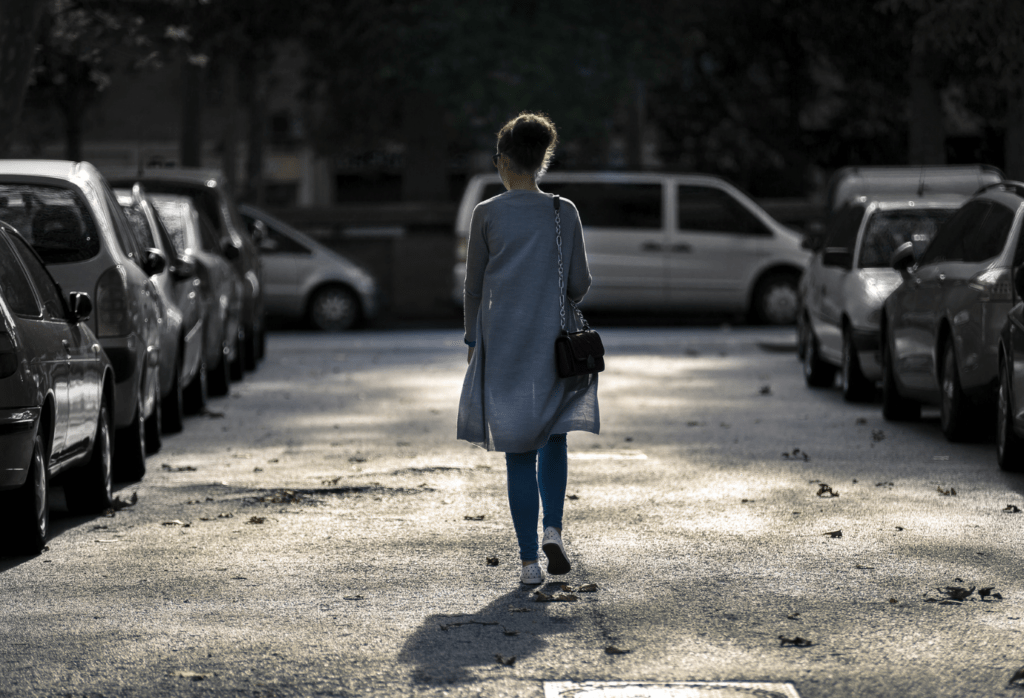One in five Australian women aged 18-24 feel less safe being alone at night in public spaces now than before the pandemic, according to new research from Plan International Australia.
The research was conducted through YouGov and surveyed almost 500 young women living in city and regional areas in Australia.
A mere five per cent of those surveyed said they felt safer since the pandemic.
For respondents with a disability, up to one in three said they felt less safe today than two years ago.
Forty-two percent of women and gender diverse people under twenty reported they felt unsafe largely due to sexual harassment.
While almost a quarter of respondents claimed to feel unsafe due to the anecdotes they heard from friends.
The research comes just months after the YourGround study was released. The crowd-mapping project was led by Monash University XYX Lab and Crowdspot, and analysed equity, access and use of public spaces such as parks, exercising and walking trails, train stations and car parks during the periodic COVID-19 lockdowns in Victoria.
Today’s release of the results also coincide with this week’s International Anti-Street Harassment, an annual event that aims to raise awareness of the pervasiveness and harm of street harassment.
Young women and gender diverse people who spoke to Plan International Australia said that the pandemic and lockdowns had resulted in fewer bystanders on the streets to help or intervene in street harassment, which has left them feeling more isolated and heightened their fears and anxiety.
One respondent spoke about the ongoing trauma she faces after being assaulted by a man in a public space earlier this year. Another commented on the psychological toll COVID-19 had on victims of street harassment.
Plan youth advocate Ruvimbo Togara said that even before the pandemic, she had experienced street harassment on multiple occasions. But now she’s feeling more nervous when moving across outdoor spaces.
“After two years of a global pandemic, lockdowns, bushfires, floods and now war, it’s no surprise that so many people in our society are experiencing issues with their mental health,” she said.
“I get the sense that all of this has emboldened perpetrators of violence – I feel like the street harassment I now experience is more aggressive, more brazen.”
Togara, a Melbourne-based entrepreneur, public speaker and writer, believes that feeling safe should be a right.
“It’s very unfortunate that even after years of research and putting things in place to make cities safer for women and gender diverse people, there’s been an increase in more of us feeling unsafe through the pandemic,” she said, adding that she is tired of walking around “expecting something bad to happen.”
“Street harassment seems to be an unending cycle and something needs to be done to break this cycle. When will I be able to walk freely and confidently without worry? I am deserving of that and so are other people who embody this experience.”
After reading the latest figures from the research, Plan International Australia CEO Susanne Legena said she was left distressed, though not surprised.
“From leering, flashing, catcalls and sexist slurs to groping, stalking, assault and rape – the reality is that the overwhelming majority of women and gender diverse people will face gender-based street harassment in their lives,” she said.
“We must ensure that all girls and young women are free, safe and equal.”
Legena said that while COVID-19 closed borders, ground entire industries to a halt and caused restaurants and retailers to shut their doors, it did not stop street harassment.
“Empty streets [have left] people who are some of the most at risk in our community to street harassment and abuse even more exposed and vulnerable: essential workers such as nurses and childcare workers, many of whom are women and migrants who had to continue commuting to work.”
The CEO of Plan Australia referenced a new global gender index that found Australia in the bottom 50 per cent in the Asia-Pacific when it comes to women’s perceptions of safety.
The index also found that just over half of Australian women over 15 feel safe walking alone at night in their home area.
“All of these findings prove that as we begin to emerge from the pandemic, the world is still off track when it comes to gender quality and the safety of women and girls,” Legena said.
“It also confirms that ‘getting back to normal’ is simply not ambitious enough, given that the ‘normal’ that prevailed before COVID-19 was failing to deliver.”
Plan International recommends three strategies to stop street harassment.
First, authorities must find ways of encouraging women to report instances of harassment. Second, improvements should be made to the responses women receive from authorities. And third, governments should invest in public awareness and behaviour change campaigns.
Plan International Australia’s six youth advocates are hoping to propel these changes, getting behind the L’Oreal Paris’ Stand Up Against Street Harassment campaign, which will see them delivering training sessions to the public to help combat sexual harassment in public spaces.
One youth leader, Elizabeth Payne, believes that any experience of street harassment is serious and deserves to be called out.
“I’ve had a lot of people come to me with disclosures of street harassment,” she said.
“I’ve experienced street harassment myself that made me fear for my safety. I’ve seen and felt first hand the confusion and anger people feel and the overwhelming sentiment that their experience ‘wasn’t significant enough’ to report.”
“As a society we have fallen into the trap of assuming if we can’t prove it, if there is no evidence other than our internal hurt, it’s not worth reporting because what are they going to do about it.”
“No one deserves to feel unsafe, period.”


